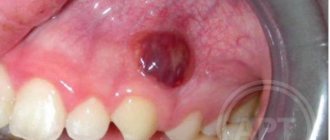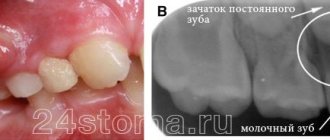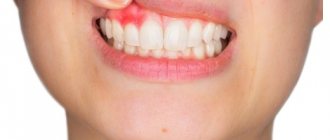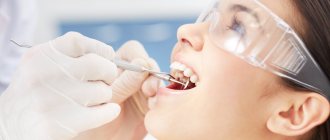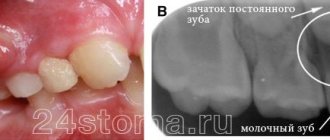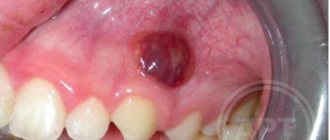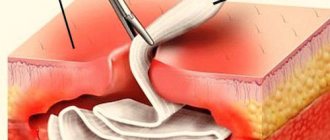Quite often, parents may notice a soft bump that appears on their child’s gum when pressed. What could be the reasons for this phenomenon?
- inflammation of the roots (both baby teeth and molars, permanent ones);
- the beginning of tooth eruption.
Why does an abscess occur?
There can be many reasons for the formation of a lump (fistula, swelling), but the most common of them is undetected or ignored caries. Not all children maintain oral hygiene and eat properly, and not all parents carefully control this, which causes caries to appear on one or several teeth at once.
If caries is not treated, it will develop into pulpitis, extending beyond the tooth area and affecting the upper part of the root. As a rule, a lump appears just near the tooth whose root is inflamed. Typically, a lump can be noticed near a tooth with caries or with a filling that was placed long ago or poorly; Another common reason for its appearance is an injury received from a strong blow or an accidental fall, which can trigger the onset of the inflammatory process.
Stages of development of an abscess:
- As a result of caries, the infection penetrates into the pulp, affecting the root tip.
- Pus begins to form near the top of the root.
- Purulent formations fall under the mucous membrane of the gums.
- A cyst appears, looking like a small lump from the outside.
The most important symptom of an abscess is a soft and painful swelling, even with slight pressure.
Sometimes, due to an excess of pus, the lump may burst under pressure, and then a fistula appears - a small hole in the gum, which is connected with the source of inflammation located in the upper region of the root. A feature of the fistula is the constant release of purulent formations.
If inflammation decreases for some reason, the fistula may close on its own. However, when the child’s immunity decreases and the inflammatory process begins again, accompanied by pus formation, the appearance of a fistula will not be long in coming.
Reasons for the formation of cones
The appearance of a swelling or bump in the oral cavity in children can be caused by two fundamentally different conditions:
- Inflammation of tissue in the area of the roots of milk or permanent teeth with the formation of an abscess.
- The formation of a cyst-like structure on the gum in the area where a temporary or molar tooth is about to emerge.
Since cysts and ulcers have different origins, it is worth considering their symptoms and treatment separately.
How to treat an abscess on the gum?
If an abscess or fistula appears, then you should not expect that the situation will resolve on its own: you need to make an appointment with a dentist. Treatment of an abscess on a baby tooth and a molar one will be different.
The appearance of an abscess on a baby tooth indicates periodontal inflammation. Such teeth must be removed, since the inflammatory process in the upper part of the root, accompanied by the formation of pus, may well spoil the molar, which will soon erupt in place of the milk tooth. This happens because the roots of temporary teeth are located next to the rudiments of molars. Bad bacteria and infection can also enter the lymph nodes under the jaw, causing them to become inflamed. The occurrence of a fistula means that pus will constantly seep into the mouth, which can cause the development of tonsillitis, since the tonsils will become infected. Various colds in a child are a direct consequence of an abscess on a tooth. Also, do not forget that toxins formed in the area of inflammation will definitely enter the bloodstream: this can result in allergic reactions, asthma and other serious general somatic diseases.
If we are talking about an abscess on a molar, then ordinary treatment is required for adults (provided that the tooth is not fundamentally damaged and can still be saved from removal).
Having discovered an abscess in a child, you should not try to cure it on your own. You can easily find a lot of advice on the Internet on how to relieve inflammation, but no amount of rinsing or even taking powerful antibiotics can eliminate the inflammatory focus located at the root of the tooth. Moreover, it is useless to hope that the tooth ache will stop. A bursting lump (this often happens) indicates only a short respite, during which, meanwhile, bacteria will still continue to enter the bloodstream and spread throughout the body. This situation can turn into a serious problem if the child has diseases of the respiratory system, heart and other internal organs.
Often, dentists suggest leaving teeth near which the inflammatory process is occurring, persuading the parents of a young patient to carry out the silvering procedure. The arguments for refusing removal can be very compelling: possible problems with diction and pain during the removal operation. However, such dentists neglect the information contained in every textbook on dentistry, which clearly states that a baby tooth with a purulent focus must be removed. Silvering will only complicate the situation, and an unresolved inflammatory process can lead to asthma, tonsillitis and even diabetes: in comparison with these diseases, temporary problems with diction will seem like sheer nonsense.
But the formation of an abscess can be prevented, and this is not difficult to do - just teach the child to maintain oral hygiene. At an early age, a child cannot be adequately responsible for his actions, including those related to the care of the oral cavity, teeth and gums, so responsibility for the procedure lies entirely with his parents, who must control how and when the child brushes his gums and teeth . It is the parents who should buy the most effective baby toothpaste that guarantees maximum protection against caries.
Teething cyst
Bumps on the gums that appear during the eruption of milk or permanent teeth (usually at 5-6 years old or much less often at 7-8 years old) have a major difference from abscesses - they are not inflammatory in nature and are only a reaction of soft tissues to the advancement of the dental crown .
Signs of an eruption cyst
Such formations form quite rarely and can appear both on the upper gum and in the area of the lower teeth. Non-inflammatory bumps do not cause any discomfort to the child and are detected only during examination of the oral cavity. Only sometimes infants may experience excessive salivation.
2-3 weeks before the tooth appears, a transparent or blue lump forms on the mucous membrane of the gum, which has a soft consistency and does not hurt when pressed. If the developing cyst affects a small blood vessel, then hemorrhage into its cavity is possible. She turns black. At the moment of eruption of the dental crown, such a lump is imperceptibly opened or gradually dissolves without a trace. The general condition of the children does not change in any way.
Treatment
This type of dental cyst does not require treatment. Sometimes, if such a lump appears in the area of the front teeth and causes cosmetic discomfort to the child, then it is possible to open it in the sterile conditions of a dental office.
Memo to parents
Even though baby eruption cysts are not dangerous and do not cause any complications, there are some things you should be aware of:
- It is strictly forbidden to open the cones yourself, since non-sterile objects can introduce infection into the gum tissue and cause the development of inflammatory reactions.
- It is extremely rare, but eruption cysts can fester. If, against the background of complete well-being, the baby begins to complain of pain in the gums, fever, and the lump itself becomes red and swollen, then you should immediately seek the advice of a dentist.
Purulent bumps and cysts during teething are not a sign of pathology in the development of the dental system. In both cases, it is important to maintain proper oral hygiene, periodically examine the mucous membranes and, if necessary, visit the dentist.
A lump on an area of the gum where there is no tooth yet: what to do in this case?
A couple of weeks before the tooth erupts, a cyst may appear on the gum, looking like a lump filled with a clear or bluish liquid. Such bumps are by no means common: dentists do not consider such formations to be a pathology requiring treatment. In addition, such formations on the gums in no way indicate an inflammatory process.
According to statistics, a small percentage of children are affected by the appearance of such a cyst. The child may not even suspect that he has a lump in his mouth, because if he touches it, there is no pain. However, a dental examination is still necessary, because the inflammatory process may still begin, in which case intervention will be required. The presence of inflammation is indicated by such signs as increased body temperature, pain when touching the lump, and swelling of the mucous membrane.
Most parents do not like the fact that their child has a lump in his mouth: in this case, you can ask the dentist to make an incision under anesthesia, as a result of which the fluid inside the cyst will come out. As a rule, when part of the cyst is removed, the crown of the tooth about to erupt is visible.
Treatment
Treatment tactics will vary depending on which tooth the abscess has developed on. If inflammation appears on a baby tooth, then the only solution is to remove it, and the treatment plan will be something like this:
- a visual inspection of the affected area is carried out;
- local anesthesia is provided;
- the lump is opened and the pus is removed;
- the diseased tooth is also removed;
- medications are prescribed;
- home treatments that include rinsing the mouth with antiseptic solutions. This helps cleanse the mucous membrane of pus and stop inflammatory processes.
If a permanent tooth is affected, then the therapy will differ in that they will try to save the tooth by cleaning the affected parts and filling the canals.
Thus, we emphasize that visiting the dentist if you find an abscess in a child is mandatory. The spread of infection will not go away on its own; on the contrary, it will affect other tissues, including the rudiments of permanent teeth.
How to help a child at home with suppuration?
If suppuration and the formation of a lump on the gum appear, it is recommended to contact a dentist as soon as possible, but, unfortunately, for various reasons this is not always possible.
If an adult can endure pain (although, of course, situations are different), then it is much more difficult for a child to endure painful sensations, and it is not easy for parents to watch their child suffer. There are ways to alleviate the baby's condition. Naturally, they will not replace full-fledged treatment, so you can resort to them only in situations where going to the doctor is impossible right now.
These include:
- take as much warm liquid as possible, which reduces intoxication of the body;
- eat liquid food (moderately warm, but not hot!), as it injures already damaged gums;
- If the pain becomes severe, you can use painkillers. For example, Nurofen or Paracetamol - the exact dosage depends on the age of the child, so before use you should carefully read the instructions for the drug;
- to reduce swelling, you can resort to cold - any frozen product from the freezer compartment of the refrigerator is wrapped in a soft cloth and applied to the cheek;
- use rinsing solutions that temporarily relieve pain - chamomile decoction or the drug chlorhexidine, which reduces irritation.
Preventive measures for oral inflammation in children
To protect your child from unpleasant painful conditions, monitor his diet and pay attention to oral hygiene. Teach your child to brush their teeth correctly - on time and thoroughly. Come up with a home game that will help you remember that brushing your teeth is necessary.
Simple rules will help you maintain healthy teeth and gums:
- Do not allow children to chew hard and sharp toys or pencils.
- Bring your baby for a preventive examination to our clinic every 3-6 months.
- Create a nutritious diet with fruits and vegetables that you can chew and bite into.
- Avoid fast carbohydrates. Immediately after eating sweets, you should brush your teeth or rinse your mouth.
And remember: if a child develops a lump on his gum above a baby tooth, as well as any unusual symptoms, consult a doctor immediately.
Preventive measures to prevent the formation of lumps on the gums
To reduce the likelihood of an abscess to a minimum, a child from childhood should be taught to carefully observe oral hygiene.
The list of the most effective measures includes:
- Brushing your child's teeth twice a day. First, parents should brush their child’s teeth themselves, showing how to do it correctly, gradually giving the child more independence in this matter;
- rinsing your mouth after every meal;
- minimizing sweets in the diet - it is important to ensure that the child keeps caramel and candies in his mouth as little as possible;
- Do not introduce your child to chewing gum (the product is especially harmful if it contains sugar).
Why does an abscess form?
Among the reasons for the appearance of ulcers may be poor oral hygiene, weak immunity, mechanical and thermal injuries, and gum disease.
Baby teeth are more often exposed to various infections, and caries spreads much faster in them. In just a few months, a cavity can form that reaches the nerve. If this is not treated, the bacteria enter the dental nerve and then affect the bone. Here they multiply, dissolve the bone and thus form pus, which can be released into the oral cavity.
Otherwise, it accumulates and appears under the gum, which swells and takes on the appearance of a lump. Sometimes it bursts, but then appears again. The danger of this process is that in any case there is an infection in the body, and the pus can damage the growing permanent tooth.
Also, the formation of an abscess can occur due to the following factors:
- periodontonitis is an inflammation of the connective tissue that is located between the cementum of the tooth and the alveolus. The process can begin due to a virus, bacteria, hypothermia or injury;
- single-gene osteomyelitis - damage to the bone and surrounding tissues due to infection in the dental canal. This is possible due to poor quality dental treatment;
- dental cyst is a formation in the bone tissue of the jaw that is filled with fluid. In this case, an abscess is formed if the cyst becomes inflamed with the formation of pus, which begins to come out;
- odontogenic sinusitis - inflammation of the mucous membrane of the maxillary sinus. Infection can occur due to untimely dental treatment or dental errors.
It is also important to treat caries in the early stages to prevent the development of pulpitis - inflammation of the pulp, which consists of various vessels and nerves that provide important functions of the tooth.
